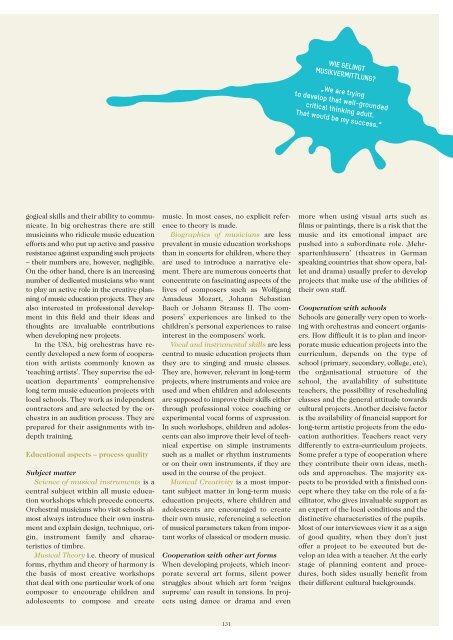exchange die kunst, musik zu vermitteln - Kunstdervermittlung.at
exchange die kunst, musik zu vermitteln - Kunstdervermittlung.at
exchange die kunst, musik zu vermitteln - Kunstdervermittlung.at
Erfolgreiche ePaper selbst erstellen
Machen Sie aus Ihren PDF Publikationen ein blätterbares Flipbook mit unserer einzigartigen Google optimierten e-Paper Software.
gogical skills and their ability to communic<strong>at</strong>e.<br />
In big orchestras there are still<br />
musicians who ridicule music educ<strong>at</strong>ion<br />
efforts and who put up active and passive<br />
resistance against expanding such projects<br />
– their numbers are, however, negligible.<br />
On the other hand, there is an increasing<br />
number of dedic<strong>at</strong>ed musicians who want<br />
to play an active role in the cre<strong>at</strong>ive planning<br />
of music educ<strong>at</strong>ion projects. They are<br />
also interested in professional development<br />
in this field and their ideas and<br />
thoughts are invaluable contributions<br />
when developing new projects.<br />
In the USA, big orchestras have recently<br />
developed a new form of cooper<strong>at</strong>ion<br />
with artists commonly known as<br />
‘teaching artists’. They supervise the educ<strong>at</strong>ion<br />
departments’ comprehensive<br />
long term music educ<strong>at</strong>ion projects with<br />
local schools. They work as independent<br />
contractors and are selected by the orchestra<br />
in an audition process. They are<br />
prepared for their assignments with indepth<br />
training.<br />
Educ<strong>at</strong>ional aspects – process quality<br />
Subject m<strong>at</strong>ter<br />
Science of musical instruments is a<br />
central subject within all music educ<strong>at</strong>ion<br />
workshops which precede concerts.<br />
Orchestral musicians who visit schools almost<br />
always introduce their own instrument<br />
and explain design, technique, origin,<br />
instrument family and charac -<br />
teristics of timbre.<br />
Musical Theory i.e. theory of musical<br />
forms, rhythm and theory of harmony is<br />
the basis of most cre<strong>at</strong>ive workshops<br />
th<strong>at</strong> deal with one particular work of one<br />
composer to encourage children and<br />
adolescents to compose and cre<strong>at</strong>e<br />
music. In most cases, no explicit reference<br />
to theory is made.<br />
Biographies of musicians are less<br />
prevalent in music educ<strong>at</strong>ion workshops<br />
than in concerts for children, where they<br />
are used to introduce a narr<strong>at</strong>ive element.<br />
There are numerous concerts th<strong>at</strong><br />
concentr<strong>at</strong>e on fascin<strong>at</strong>ing aspects of the<br />
lives of composers such as Wolfgang<br />
Amadeus Mozart, Johann Sebastian<br />
Bach or Johann Strauss II. The composers’<br />
experiences are linked to the<br />
children’s personal experiences to raise<br />
interest in the composers’ work.<br />
Vocal and instrumental skills are less<br />
central to music educ<strong>at</strong>ion projects than<br />
they are to singing and music classes.<br />
They are, however, relevant in long-term<br />
projects, where instruments and voice are<br />
used and when children and adolescents<br />
are supposed to improve their skills either<br />
through professional voice coaching or<br />
experimental vocal forms of expression.<br />
In such workshops, children and adolescents<br />
can also improve their level of technical<br />
expertise on simple instruments<br />
such as a mallet or rhythm instruments<br />
or on their own instruments, if they are<br />
used in the course of the project.<br />
Musical Cre<strong>at</strong>ivity is a most important<br />
subject m<strong>at</strong>ter in long-term music<br />
educ<strong>at</strong>ion projects, where children and<br />
adolescents are encouraged to cre<strong>at</strong>e<br />
their own music, referencing a selection<br />
of musical parameters taken from important<br />
works of classical or modern music.<br />
Cooper<strong>at</strong>ion with other art forms<br />
When developing projects, which incorpor<strong>at</strong>e<br />
several art forms, silent power<br />
struggles about which art form ‘reigns<br />
supreme’ can result in tensions. In projects<br />
using dance or drama and even<br />
131<br />
WIE GELINGT<br />
MUSIKVERMITTLUNG?<br />
„We are trying<br />
to develop th<strong>at</strong> well-grounded<br />
critical thinking adult.<br />
Th<strong>at</strong> would be my success.“<br />
more when using visual arts such as<br />
films or paintings, there is a risk th<strong>at</strong> the<br />
music and its emotional impact are<br />
pushed into a subordin<strong>at</strong>e role. ‚Mehr -<br />
spartenhäusern’ (the<strong>at</strong>res in German<br />
speaking countries th<strong>at</strong> show opera, ballet<br />
and drama) usually prefer to develop<br />
projects th<strong>at</strong> make use of the abilities of<br />
their own staff.<br />
Cooper<strong>at</strong>ion with schools<br />
Schools are generally very open to working<br />
with orchestras and concert organisers.<br />
How difficult it is to plan and incorpor<strong>at</strong>e<br />
music educ<strong>at</strong>ion projects into the<br />
curriculum, depends on the type of<br />
school (primary, secondary, college, etc),<br />
the organis<strong>at</strong>ional structure of the<br />
school, the availability of substitute<br />
teachers, the possibility of rescheduling<br />
classes and the general <strong>at</strong>titude towards<br />
cultural projects. Another decisive factor<br />
is the availability of financial support for<br />
long-term artistic projects from the educ<strong>at</strong>ion<br />
authorities. Teachers react very<br />
differently to extra-curriculum projects.<br />
Some prefer a type of cooper<strong>at</strong>ion where<br />
they contribute their own ideas, methods<br />
and approaches. The majority expects<br />
to be provided with a finished concept<br />
where they take on the role of a facilit<strong>at</strong>or,<br />
who gives invaluable support as<br />
an expert of the local conditions and the<br />
distinctive characteristics of the pupils.<br />
Most of our interviewees view it as a sign<br />
of good quality, when they don’t just<br />
offer a project to be executed but develop<br />
an idea with a teacher. At the early<br />
stage of planning content and procedures,<br />
both sides usually benefit from<br />
their different cultural backgrounds.


